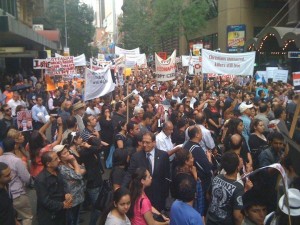 The 25 January – “Egyptian Revolution” – as many refer to it,willgo down in history as a major turning point in Middle Eastern politics.
The 25 January – “Egyptian Revolution” – as many refer to it,willgo down in history as a major turning point in Middle Eastern politics.
Gone are the days where anyone would ever dare to think of criticizing the president, yet alone protesting for 15 consecutive days demanding his departure. The protestors are not following any charismatic leader, but standing up for their own values and dignity to cast out a corrupt ruling regime. They have already forced changes in government, and pressured Mubarak not to stand for the next re-election in September. Amendments to various articles in the constitution have been promised to be made. Gamal Mubarak’s plan, to be his father’s successor is in tatters after hisresignation as the head of the National Democratic Party’s policy committee. After a 30 year rule, Mubarak’s appointing a vice president, Mr. Omar Suleiman, the chief director of general intelligence could set a precedent for next future leadersto follow. Despite all these events, the protestors’ courage and enthusiasm will face more complex challenges as the uprising enters its third week.
The military which is a very well respected in Egypt has been neutral, but now is trying to persuade protestors to give up their control of the Tahrir Square. Egyptian society is divided; one faction is calling for the end of the protests which have already achieved its goals from their point of view. The other- has no confidence in the current system and regime and is demanding Mubarak’s immediate resignation. To many, this is an irrational way of thinking especially after Mubarak vowed to the worldthat he would not stand for re- election. But who could blame them? Promises were made over the last 30 years -and broken.The military receives annual aids from the US and is in good terms with Israel which is crucial for the stability of the region and will be a very tough organization to tumble.
The Muslim brotherhood, Egypt’s largest and most organized opposition party has previously said it would not negotiate until Mubarak had stepped down. Over the past few days, that has all changed and the group initiated talks with the Vice President. That aggressive move may imply their change of strategy in dealing with the government which may create nervousness amongst other opposition parties and Egypt’s Christians – the Copts. The Muslim Brotherhood is officially banned by the State but its activities are generally tolerated. It claims that it isagainst violence, but this notion is not very well trusted amongst many Egyptians. Radical Islamic groups like Hamas, Islamic jihad and Al-Qaeda are off-shoots from the brotherhood. Their actions of jihad are stemmed out of its ideology and philosophy of creating a worldly Islamic empire ruled by a caliphate. It should be noted that Sadat’s killerKhalid Al-Islambouli and Dr. Ayman El-Zawaheri (the ‘brain’ of Al-Qaeda) were members of the brotherhood. Twochallenges facing the brotherhood’s rise to power is first the military and secondly the failure of sharia law- based societies(such as Gaza, The Taliban and Somalia ) which promote the brotherhood’s slogan ‘Islam is the solution’ , to actually provide better living conditions for their citizens, this making them lose public confidence, support and credibility.
The Coptic case is of a highly significant importance to the stability of Egypt. That is a fact. Basic human rights for Copts have been neglected for decades. The Government has been neglecting its basic responsibility of enforcing the law and bringing perpetrators to justice in countless sectarian attacks against the Copts. Amendments to a number of articles in theEgyptian Constitution including Article 2 which states “Islam is the official religion of the state, and sharia law is the main source of legislation” -is seen by Copts as a major reason of theinequality and prejudice that has befallen them. The unified law for building places of worship presented to the Egyptian parliament 15 years ago is still under review!! And the list goes on …. To many political analysts this is most probably an intentional strategy by the Government to create a balance of force in its dealing with the Muslim brotherhood on one hand and the Copts on the other.
The Copts, represented by lawyer Mr.Nagib Gebrael , the president of the Egyptian Human Rights Federation and other activists will be holding talks with the Vice President in regards to the Coptic case. It’s of vital importance that the newregime not just acknowledges the problems that the Copts face but to act on them in a timely and effective manner. Thesituation for the Copts has deteriorated in the last 30 years beyond any reasonable lateral conviction, and one would hope for the sake of Egypt, who we call the mother of all lands, that the Coptic case is seriously attended to before we are all consumed in a fire that may engulf us, hence then it will be too late.



